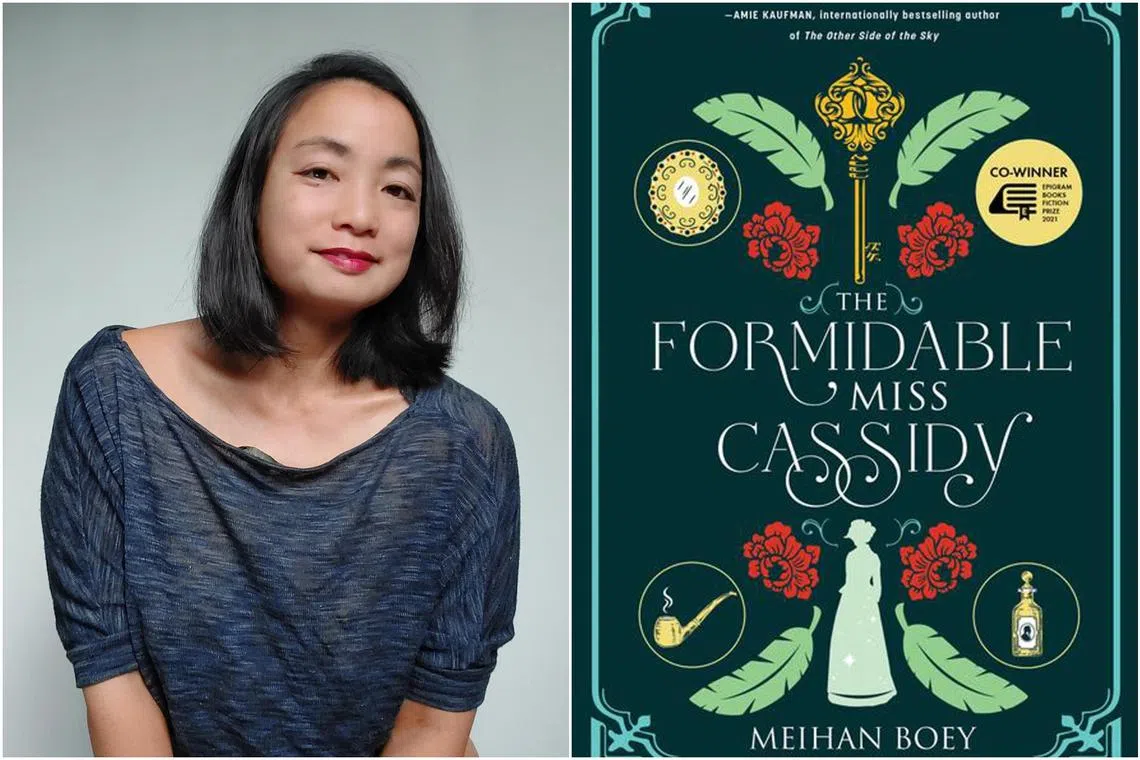Meihan Boey’s third entry to Miss Cassidy series wins $25,000 Epigram Books Fiction Prize
Sign up now: Get ST's newsletters delivered to your inbox

The Formidable Miss Cassidy by Meihan Boey has secured releases in Britain, the United States and Italy.
PHOTOS: COURTESY OF MEIHAN BOEY, EPIGRAM BOOKS
Follow topic:
SINGAPORE – Meihan Boey, best known for her supernatural Miss Cassidy series blending Victorian tropes and Asian monsters, is the winner of 2025’s Epigram Books Fiction Prize.
Her as-yet-unpublished The Mystical Mister Kay is the third entry in the Miss Cassidy universe that spans colonial Malaya, Scotland and London. It prevailed over three other finalists to make Boey a second-time winner of the $25,000 grand cash prize, earning her another contract with the publisher specialising in Singapore literature.
The 48-year-old said at the Aloft Hotels gala ceremony on Feb 13: “My assumption was always that it is very unlikely for the third in a trilogy to win an award. It was very unexpected.”
When asked why she chose to publish with Epigram, Boey said: “So far the support that Epigram gives, I find it second to none.”
She added that her agent from Epigram is the reason she has contracts in the United States, Britain, Albania and Italy. “All that does not happen without a really strong publisher.”
The Mystical Mister Kay picks up the multi-limbed tale after The Formidable Miss Cassidy (2021) sequel The Enigmatic Madam Ingram (2023)
The Enigmatic Madam Ingram is also slated for a UK release by Pushkin Press in 2026.
The title in this latest entry shifts its focus from the women to ghost-seer Mr Kay, who sets off for Britain in search of the mysterious Miss Cassidy after her disappearance. In the English city of Tolwich, he encounters Malayan Princess Nora, head of a ladies’ seminary for Asian princesses, where, once more, death stalks the Singaporean businessman.
The five-member judging panel said the decision for The Mystical Mister Kay was unanimous and that Boey’s follow-up captivated them with her signature blend of historical fantasy and mystery.
Panel chair and publisher of Epigram Books Edmund Wee said: “It is an exhilarating read and great storytelling that combines East and West so beautifully.”
The panel included former Kinokuniya store director Kenny Chan, former The Straits Times editor-in-chief Cheong Yip Seng, senior lecturer at the National Institute of Education Anitha Devi Pillai and Nikkei Asian Review editor-at-large Gwen Robinson, which presided over a list of four finalists whittled down from 58 submitted manuscripts.
Mr Chan said of Boey: “Her world-building is world-class. It is a real marriage of the colonial universe and the Singapore universe.”
The other three finalists are Rachel Tey’s Finding Chopin, about a 19-year-old protagonist and his mother’s dangerous unearthing of memories for a school project; Ng Yi-Sheng’s fabulist retelling of the rise of Sang Nila Utama from the perspectives of the men and women who paved his way to power, Utama; and Sunita Sue Leng’s The Unlikely Motherhood Of Shaleni, exploring parenthood in the digital age through adoption.
All three will get $5,000 and also have their manuscripts published and placed in bookstores by Epigram Books later in 2025.
The Epigram Books Fiction Prize was, until recently, Singapore’s richest literary prize. Dr Alan HJ Chan Spirit of Singapore Book Prize
For non-fiction, there is the $50,000 National University of Singapore’s Singapore History Prize. Only the Epigram Books Fiction Prize is given out annually, though it was suspended for a year in 2024 when the publisher redirected resources towards children’s books.
Epigram Books shut its bookshop at the Singapore Art Museum
“Bookshops are important spaces. It is not just a commercial outlet, it is a cultural space.”
Additional reporting by Srinidhi Ragavendran


